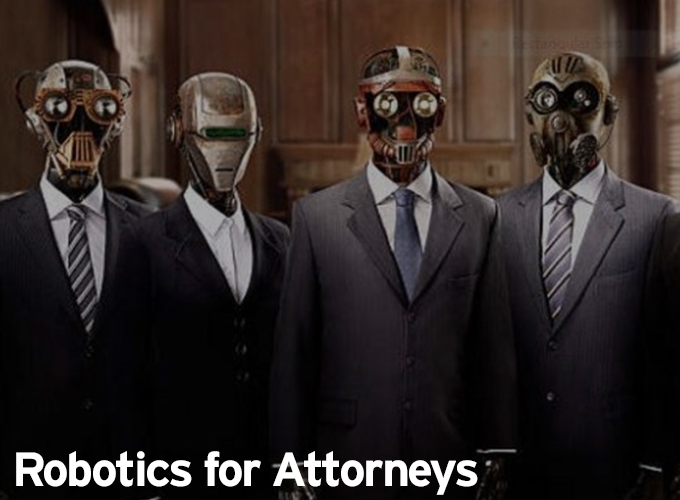“Good morning, I would like you to meet your legal team.” Artificial intelligence has proven useful in scanning and predicting what documents will be relevant to a particular case.
Len Calderone for | RoboticsTomorrow
Attorneys might just be a little worried that artificial intelligence might just be applying for their jobs. Even more so than attorneys, paralegals may become extinct, as robots can research topics and case references quicker and more accurately than a person can.
Artificial intelligence has proven useful in scanning and predicting what documents will be relevant to a particular case. Yet other attorney’s duties, like advising clients, writing legal briefs, negotiating and appearing in court are still beyond the ability of a robot.
To be a good attorney, one has to have an exceptional memory to remember and apply the exact subsection of a documented law. To represent a client effectively in court an attorney needs to review many similar cases so that he or she can state references to relevant cases. A robot attorney will not have mental blocks nor will it have human bias. It also will not require the overhead cost of paralegals or legal assistants to help with reference cases.
Robots will be required to go through training to be able to successfully understand a given case so that it can discuss the appropriate references and sections of law. It will take a robot only days or maybe months to be trained, while a law student will need seven years of study.
It’s tough keeping up with the latest rulings in the legal field. Attorneys or paralegals can spend hours researching legal documents and past cases, which is expensive. Using a robot for research will lower a client’s bill.
The high cost of legal research is one of the major obstacles to affordable legal representation. Law is a growing stack of complex data, and the research requires many hours and people time. A recent study found that new law associates spend about 35 percent of their time performing legal research. With so much legal data out there, it’s impossible to know what an attorney doesn’t know.
Ross Intelligence is a startup which helps attorneys find relevant cases using natural language search. An attorney asks questions in plain English; and ROSS then reads through the entire body of law and returns a cited answer and topical readings from legislation, case law and secondary sources.
ROSS is using a combination of off the shelf and proprietary deep learning algorithms for its AI stack, while using IBM Watson for some of its natural language processing capabilities. The system analyzes the meaning and relationships between words to understand the legal concepts they form. Because it’s built upon a cognitive computing system, ROSS is able to sift through over a billion text documents a second and return the exact passage the attorney needs.
Note: Watson is not one system. It’s not one supercomputer. It’s a set of services in the cloud that can be used and can be trained. All these Watson systems are learning systems. There are industries where people are overwhelmed with information and they can’t keep up with what’s happening. Therefore, these systems can be trained by different entrepreneurs or enterprises for whatever use they need them to perform.
LISA is an impartial robot attorney. LISA's AI technology allows two parties to create legally binding agreements together. It helps both parties find a middle ground as quickly and cost effectively as possible. A human attorney cannot advise or act for both sides when creating an agreement; but LISA’s machine impartiality means she can save both sides time and money. LISA gets basic legal questions answered, documents drafted and an agreement achieved on terms that are fair and reasonable for both sides.
LISA fundamentally changes the way the average person or business obtains affordable self-serve access to quality legal expertise, documentation and advice, globally. It makes access to legal services cost effective, time saving, and transparent for businesses to acquire their legal needs by using technology wherever possible in the first instance before moving on to hire human attorney support, should that become necessary or desired.
LISA makes access to legal services easy. It serves the many rather than the few by empowering the neglected 90% of people who can’t afford an attorney; and make it more convenient for the existing 10% who already use attorneys.
Research is only a portion of a law firm’s work on a case. Each case is a distinct project, with multiple tasks that are required on a daily basis, which leads to various objectives. Case management software is already available to help attorneys and paralegals manage tasks, track billable hours, and condense documents in one easy-to-find place.
Giving these tasks to a robot means that this information would be taken a step further, with systems having the ability to automatically retrieve and catalog necessary documents based on minimal information. Billing would be also automated, with mobile devices and PCs set to track activity without additional effort from the legal professional.
One benefit to artificial intelligence is that it would have the power to analyze a judge’s past rulings and shift its arguments accordingly. The question is, “Would a judge ever let AI-based legal professionals in the courtroom?”
AI will open up new opportunities for teaching. Many or most of the Socratic method questions that get posed in a first-year contracts class will likely be answered by a student’s robotic reference. AI should make complex law, such as Dodd-Frank, the Affordable Care Act, the Foreign Corrupt Practices Act, or mergers and acquisitions integration much easier to understand.
All attorneys know that conducting a wide-ranging due diligence review in connection with the large amounts of data that are part of any merger, acquisition, or other sophisticated corporate transaction is absolutely necessary. An AI system could provide such due diligence in a faster, cheaper, and more systematic manner.
It will be interesting to witness the impact that AI will have on the legal profession. Some people think that AI may replace attorneys and other legal professionals. Actually, AI should free up time for lawyers to perform more essential work for their clients. While AI may offer attorneys important technology to provide effective, quick legal counsel to clients, AI is not an alternative for a lawyer’s own empathy, judgment, instinct, and personal relationship with clients.
The content & opinions in this article are the author’s and do not necessarily represent the views of RoboticsTomorrow
Comments (0)
This post does not have any comments. Be the first to leave a comment below.
Featured Product


